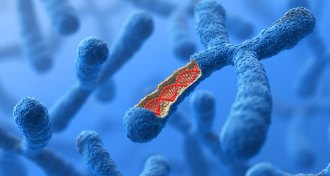News
-
 Health & Medicine
Health & MedicineZika hasn’t been in the news much, but that doesn’t mean it’s gone
Cases of Zika have dropped as more people become exposed, but the virus will likely emerge again in the future.
-
 Climate
ClimateAs ice retreats, frozen mosses emerge to tell climate change tale
Plants long entombed beneath Canadian ice are now emerging, telling a story of warming unprecedented in the history of human civilization.
-
 Paleontology
PaleontologyT. rex’s silly-looking arms were built for slashing
Tyrannosaurus rex may have used its small arms for slashing prey.
-
 Health & Medicine
Health & MedicineUsing high-nicotine e-cigarettes may boost vaping and smoking in teens
Vaping higher concentrations of nicotine is linked to how much and how often teens smoke and vape months later, a new study finds.
-
 Genetics
GeneticsNew CRISPR gene editors can fix RNA and DNA one typo at a time
New gene editors can correct common typos that lead to disease.
-
 Life
LifeNanoscale glitches let flowers make a blue blur that bees can see
Bees learn about colorful floral rings faster when nanoscale arrays aren’t quite perfect.
By Susan Milius -
 Cosmology
CosmologyWhat detecting gravitational waves means for the expansion of the universe
The latest LIGO signal proves that gravitational waves travel at the speed of light, ruling out a swath of cosmological theories in the process.
-
 Health & Medicine
Health & MedicineRobotic docs can boost surgery time and cost
Robots in the OR may not be worth the extra time or money for all procedures.
-
 Life
LifeHow bird feeders may be changing great tits’ beaks
Longer beaks may be evolving in U.K. great tits because of the widespread use of bird feeders in the country.
-
 Anthropology
AnthropologyScientists battle over whether violence has declined over time
People are no more violent in small-scale societies than in states, researchers contend.
By Bruce Bower -
 Genetics
GeneticsDoubling up on ‘junk DNA’ helps make us human
DNA duplicated only in humans may contribute to human traits and disease.
-
 Life
LifeThe next wave of bird flu could be worse than ever
Deadly bird flu can pass between ferrets through the air.